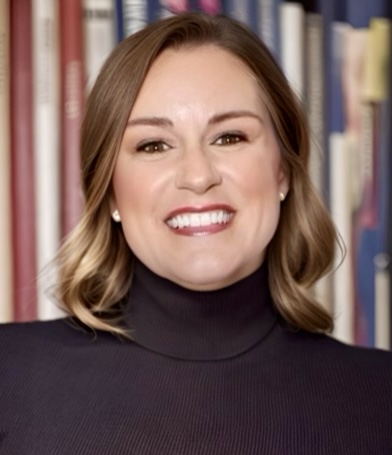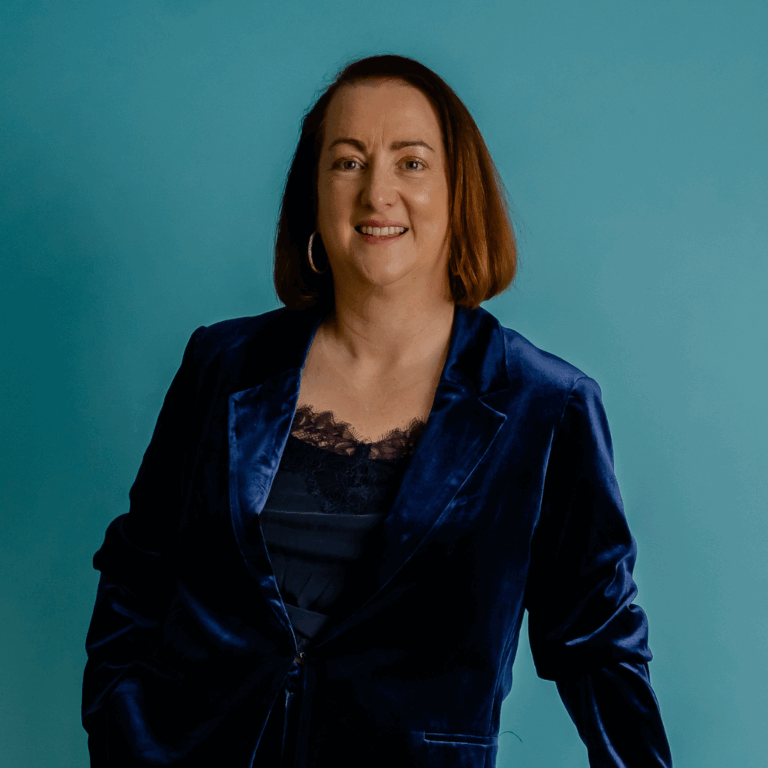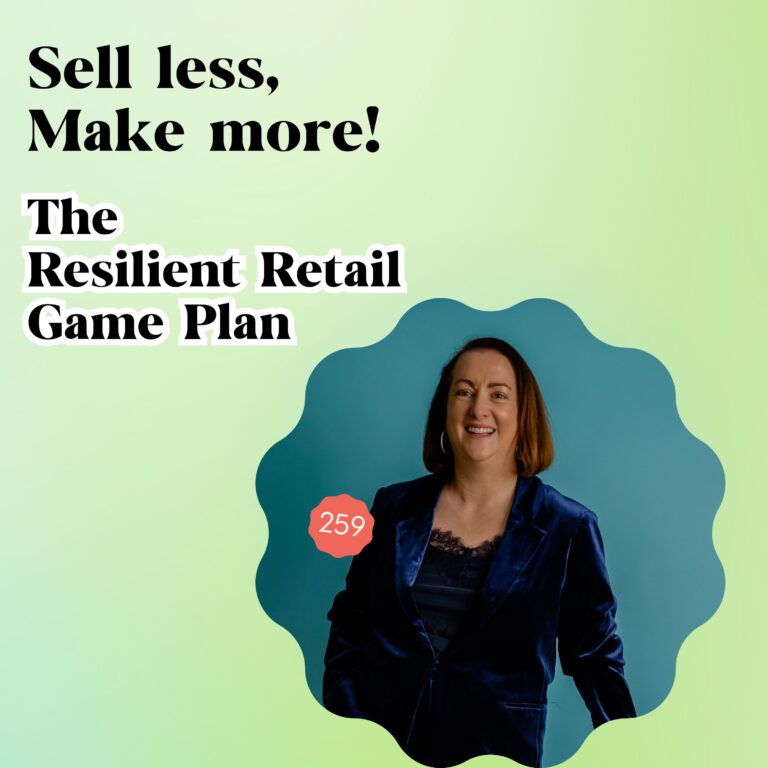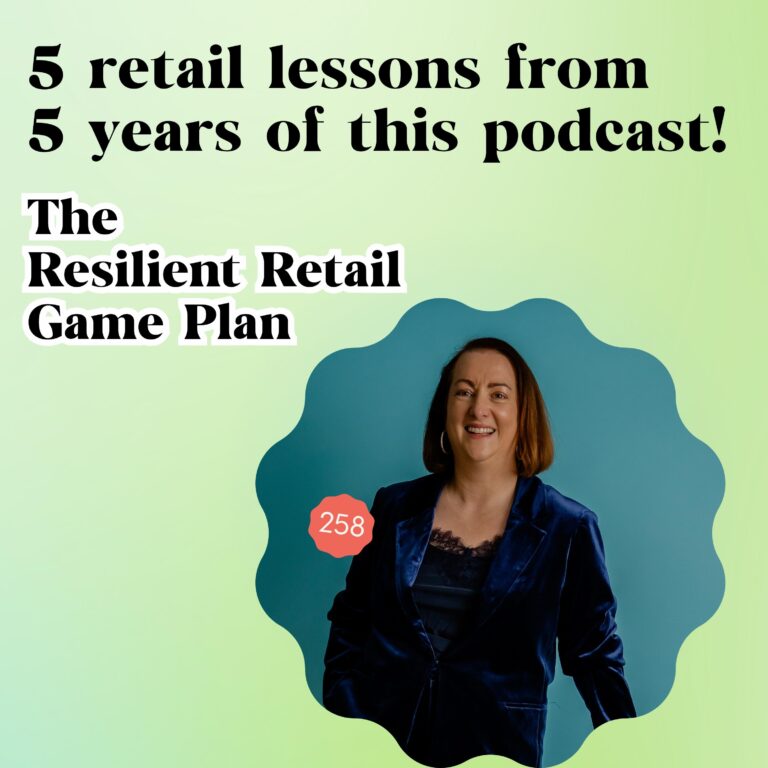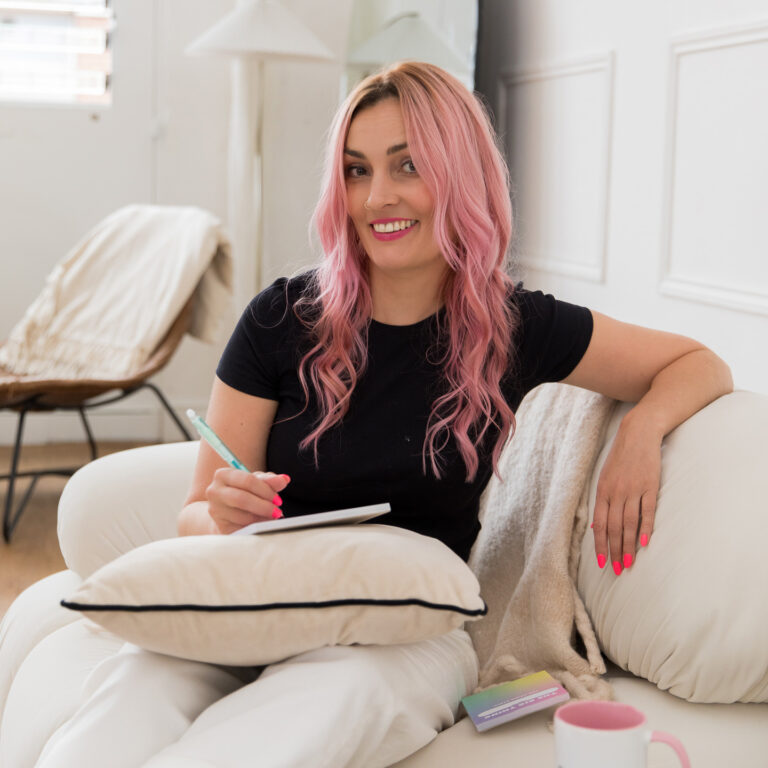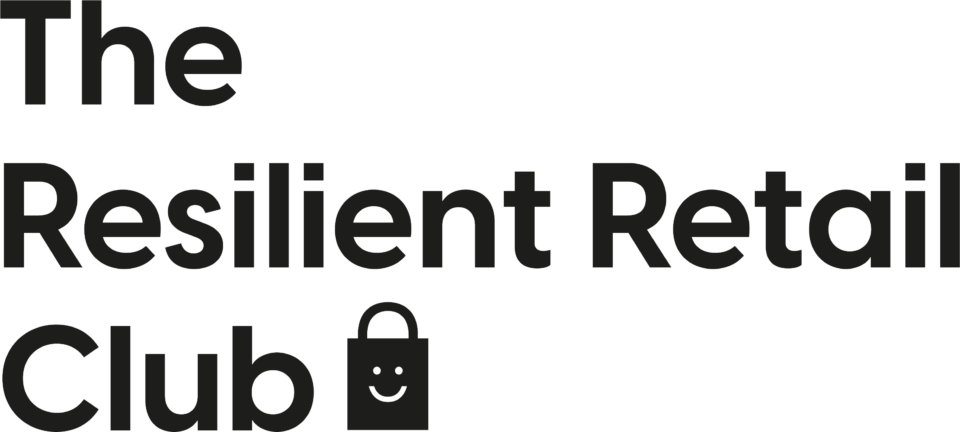Building a Purpose-Led Brand with Lucy Greenwood
Catherine Erdly: What’s it like being the co founder of one of the fastest growing UK retail companies? I’m going to be asking Lucy Greenwood, co founder of clothing brand Lucy & Yak, that question in this interview that is taken from the Retail ROAR Summit that was broadcast in February originally this year.
Hi, I’m Catherine Erdly. I’m the founder of the resilient retail club, which is my membership group, a mastermind for product businesses. You can find out more at resilient retail club. com. And you’re listening to the resilient retail game plan podcast, where we’re going back in time in a series of two episodes where we’re revisiting the most popular sessions from the Retail ROAR Summit.
And today we are hearing from Lucy Greenwood, co founder of Lucy and Yak.
Welcome to the Resilient Retail Game Plan, a podcast for anyone wanting to start, grow or scale a profitable creative product business with me, Catherine Erdly.
The Resilient Retail Game Plan is a podcast dedicated to one thing, breaking down the concepts and tools that I’ve gathered from 20 years in the retail industry and showing you how you can use them in your business.
This is the real nuts and bolts of running a successful product business, broken down in an easy, accessible way. This is not a podcast about learning how to make your business look good. It’s the tools and techniques that will make you and your business feel good.
Confidently plan, launch and manage your products and feel in control of your sales numbers and cashflow to help you build a resilient retail business.
Do you want to just introduce yourself super quickly for anyone who doesn’t know who you are?
Lucy Greenwood: Yeah, so I’m Lucy. I founded Lucy & Yak in 2017. Lucy & Yak’s an ethical and sustainable clothing brand based in the UK. And yeah, it’s, you know, we’ve been doing it for seven years now and it’s just growing and growing.
Couldn’t have wished for anything better, really.
Catherine Erdly: It’s fantastic because we worked together, I think it was back in 2018, 2019. It was way back at the beginning. So it’s amazing to see the growth. And last year you were on the Sunday Times top 100 fastest growing UK companies list, which is completely mind boggling.
What would Lucy Greenwood say is the secret of success?
Catherine Erdly: So if you had to sum it up, I know there’s so much hard work that’s gone on behind the scenes, but what would you say is the kind of secret of success, if you like?
Lucy Greenwood: Do you know what? I think the main thing is being authentic. Finding something that you love and doing it because you love it rather than because…I think if money’s your goal, it can still work.
Don’t get me wrong. I’m sure there’s a lot of people that have made themselves very rich out of that, but I feel like customers and just people in general have become a lot more wise to traditional marketing tactics.
So I think you have to be coming from a place of authenticity and genuinely embody what your brand or business is, and genuinely be passionate about it. And when I say that, I don’t mean necessarily, you can be passionate about different things.
So I wasn’t necessarily ever passionate about clothing, so that would be the thing that you’d assume, but actually The passion came from wanting to create a lifestyle for myself that allowed me to travel and do the things I love.
And that’s how the brand was born. Because the clothing industry tends to be quite global now, a lot of stuff’s manufactured abroad. It allows me to travel for work. I travel for photo shoots and things, inspiration trips. So it’s a really good industry to be in for travel.
So it’s like that’s where my passion was, but also there was a real sort of passion for wanting to do it differently as well. I actually went to university and studied fashion. So even though I say I’m not that interested in fashion, there was so much happening early on, but then I just lost interest in it.
University just turned me off it. And I was so like. I just couldn’t see myself in the industry as I knew it and what I’d heard, what I knew of it.
Catherine Erdly: Yeah.
Lucy Greenwood: So I just ran as far away from it as possible and didn’t work in fashion ever. And then it was about 10 years later that I ended up starting Lucy & Yak and I always remember We had like one ethics class.
I think it was in my, in a marketing class, but it was about ethics. And it was the one thing that I always remember is they showed us , I think it was the time when there was a lot of brands getting the sort of sweatshop stuff was getting talked about that. That really shocked me because I didn’t know anything about that at the time.
And I think that always stuck with me. So when I did come to start my own business, that was always something that I was really passionate about. And I knew that I wanted to do it differently and make sure that wasn’t happening in our supply chain. So yeah, it’s not necessarily the product necessarily is the passion, but I think as long as there’s something that you love about the lifestyle that you’re creating with your business, then I think that comes through.
And I think customers, that’s what sort of customers. Buy into, I suppose they want to be a part of that.
Catherine Erdly: Yeah, they want to feel that passion, I guess, would you say?
Lucy Greenwood: Yeah, they want, and I think they want to feel like they’re a part of something. It’s not, I think it used to be, I remember a couple of years into the business, me and Chris were like who was my co founder, we were sat talking about, cause it just blew up and we were like what like, what is it?
We were trying to like work backwards then and go, what is it? Why are people wanting to buy this brand? And, I felt like at the time we probably were right place, right time as well, because I feel like there was a bit of a shift happening in, in the world where how people express themselves through clothing used to be about, the brand that shows how much money you’ve got, I’m going to wear this brand that tells you that I’ve got enough money to afford this brand.
But then I felt like what was happening with our brand was people were wearing their values. It was like, No, this is what I care about. And obviously there’s brands way older than us. Patagonia for one is, one of my hero brands that have been doing that forever. And I think they’ve had a strong community of customers that have always absolutely worn their product because of what they stand for.
But I don’t, I’m quite niche. There wasn’t a lot of brands out there like that. And I think now that’s what you need to be as a brand. You need to have strong values that then your sort of, your people will come to
The mistake that turned into Lucy & Yak’s brand identity
Catherine Erdly: you. So it’s not conspicuous consumption, it’s conspicuous values. Yes. Which I, and I love the story, I love the fact about Lucy and Yak that actually the fact you have your visible label was originally a mistake, right?
Lucy Greenwood: Yeah, so we made the first we made 30 pairs of dungarees to begin with in five different colours, I think, and we didn’t put any logo on. And we had to, so we sat it out. Selling vintage clothing on Depop. And then we, so the reason why we grew quite quickly as well was we already had a bit of a following on Depop from a related business, selling vintage.
So we had about 18, 000 followers on Depop when we launched our own brand and we launched these 30 dungarees and didn’t really think it would be a brand. Just thought, you know what, how can we like still make a little bit of money through this, but have more than one piece to sell because when you’re doing vintage and taking a photograph of one piece and they say, Oh God, I spent so long on those photographs and now it’s gone.
So we, when we went on a trip to India, we decided to have a go at making our own stuff. And so the first 30 pairs we made didn’t have any logo on, and then they sold out. And then I think we made another 60. They sold out and we were like, wait, we’re onto something here. So we started discussing whether we should have a logo, put a brand on it, and we discussed it with the manufacturer, but we didn’t say we wanted it.
He just went and did it. And so the next lot came through with these logos on and we were like, what is this font? It wasn’t really a logo, it was just Lucy and Yak written in a font. Anyway, we went with it because he’d done it and they sold out and we’re like, all right, okay, people want to wear the brand on there.
And then we started getting messages from people later, like a few months later, being like, I got one of your first pairs and we didn’t, it didn’t have a logo on, can you send me a logo so that I can sew it on?
Catherine Erdly: And then he was saying people were recognizing each other because they would see other people.
Wearing the Lucy and Yak, and they’d be like, okay, you’re a fellow superfan,
and they’re all from that era.
Lucy Greenwood: Yeah, and do you know what, like when we were, it’s funny that because the community that’s built around it. Again, I think there’s, it’s that authenticity and that I think your customers really want that two way relationship with you. They want to feel like they know you and you know them and you listen to each other.
And I think when we first quit our jobs and went traveling years before we started Lucy & Yak, Me and Chris, we started making these like little pouches and we were selling them to other travellers and they were made out of like old clothing, so they were sustainable, they were made from just like old clothing that was left behind in hostels, but then what was happening was we met so many people when we were travelling and we were selling them to them and when we left New Zealand, people were messaging us saying, Oh, I bumped into someone and they had one of your pouches. And I was like, Lucy and Chris. And so it was this community that was created where people were making friends in New Zealand through us. And we weren’t even there anymore. And that’s what’s happened with Lucy and Yak. So I think I think that must come from, I don’t know, I suppose it’s just your people, isn’t it?
People that resonate with how you are and who you are and I don’t know, I suppose enjoy that and so want to be a part of that in some way, and I think that’s happened there and then it continued through into Lucy and Jack.
Catherine Erdly: Completely. And actually, that was one of the questions I wanted to ask you, because one of the things I’m really fascinated about is that community.
It’s clear whenever you talk to anyone who loves Lucy and Yak and being in your own Facebook groups, for example, and they’re real super fans. It’s really clear that right from the get go, it was more than clothing almost to people, wasn’t it? It was like that sense of community. But, That sounds manageable almost when it’s like people in New Zealand bumping into each other with the pouches.
The impact of community on Lucy & Yak
Catherine Erdly: But now we’re talking about a much bigger community. How has your approach to the community changed over the years? Or do you feel like it’s essentially the same approach, it’s just the number of people in the community have got bigger?
Lucy Greenwood: Yeah, I think, I don’t think it has changed massively because I don’t think we ever, Because when we first started the brand, we didn’t really, the one bit I didn’t really consider was who the customer was going to be.
Or You know how, I don’t know, one of the things that’s always surprised me or one of the things that I look back on and go, that’s amazing and that makes me feel really good, but I never really considered that in it. And it was how many amazing emails and messages we get from customers saying how much the brand has changed their lives, that they, they didn’t feel like there was a brand out there that was for them. Now they feel like there is. And it’s clothing that have made them feel like themselves for the first time ever, and I think we get that a lot from people who maybe their bodies have changed over there over their lifetime. And they’ve lost their way a little bit, like after having kids or something like that, and they’ve lost their way a little bit and they don’t really know how to dress anymore.
Or, and it’s. They tell us that, they found, they feel like this brand speaks to them on that level. And I think that was never really something that I expected. And so when that started happening straight away, I think we’ve just always let it be really organic, but we really listen, I think one thing that we’ve always done as a business is really listened to what our customers are telling us.
And sometimes I think we’ve listened too much because sometimes it might seem like a really big majority of people, but it’s just a few people that like, shit, I need to do this thing. And it’s been the wrong decision. For the wider community, but I think that’s all right. I think what we’ve always realized is as a business as well, is that it’s fine to get it wrong.
It’s fine to make mistakes. I think that’s the thing with a strong community. And as long as you’re honest with them and you communicate well with them and you listen to them, they will always forgive you when you mess up. So that’s one of the things that’s been really strong for us. And it’s not changed in the last seven years that we.
Genuinely do own up when we mess up and we’re transparent about our mistakes and things like that. And I think we always say that when something goes wrong in the business, we panic, we used to be like, Oh God, this is terrible. Like everyone’s going to, our customers gonna all hate us. And then actually.
However we end up handling it, it always ends up being a positive because it’s that thing of if you if, of course, if a brand always gives you perfect customer service and there’s never anything goes wrong, then they never really get an opportunity to show you what they do when things do go wrong.
And that’s, what’s memorable.
I had this thought the other day. You know, I was there’s two brands that I use for, I can’t remember what they are now for some, for something in my life I can’t remember. And one of them really messed up something from it. And one of them has been absolutely perfect the whole time.
I’ve never really had to think about it. One of them, yeah, thing up, but how they handled it has now made that my favorite brand. And I’m like, but this one’s never done anythinG wrong.. Yeah, but because it’s memorable, almost, it’s not real. It’s not really. It’s like real life is we make mistakes. We’re all human. And I think when you see a, when a business is too perfect, it’s almost come on, this must be too good to be true.
And I think it’s that, that when people see, I think when customers see that you might look like you’ve got all your shit together, but actually you keep getting, you messed up on this, you messed up on that. It just makes you human. And I think people want from their brands.
And yeah, I think that’s the thing that we’ve managed to keep all the way through. And I think we always will is that conversation, that two way conversation with our customers and genuinely listening to them and genuinely trying to make changes where we feel like we can, that they’re requesting.
Catherine Erdly: That’s such a good point about, I think that you, I think you’re absolutely right that when people make a mistake, it’s an opportunity to show excellent customer service to put it right. And it does really. Indeer you to somebody if something goes wrong and they go out of their way to fix it, almost as you said, it makes you feel more warm and fuzzy towards them.
Lucy Greenwood: It makes sure it makes it like humanizes it almost normally you feel like you’re talking to a business. It’s just a business transaction that you’re doing and everything is great. You get this automated email. Thanks for your order. It’s on its way. Everything has gone perfect. But then if something goes wrong, you actually get to have a conflict like a human gets to have a conversation with.
With the customer and it, and I think we have got an incredible customer service team as well, that really genuinely care and we get so much praise for them because we don’t really have a set this is the response that you give for this. And this is, it’s no, do you know what? We hire people that we know are kind people and we’ll make the right decision for the customer and.
And I think customers really feel that as well, that like they’re talking to someone who genuinely cares and who is going to resolve it for them in the best way they can. And I think that, yeah, I think when stuff goes wrong, it gives you that chance to actually have that conversation.
Catherine Erdly: Yeah, that’s interesting.
And do you feel that you’re just as close to the community as you’ve ever been, even though it’s that much bigger? Do you feel that it’s still You’re still able to have that real two way conversation and listen to them and get their feedback. It doesn’t become overwhelming.
Lucy Greenwood: Yeah, for sure. Cause we, so we’ve got we’ve got a Facebook community group, which is great.
That’s probably got about 30, 000 members in it now. It might even be more, which is huge. And that’s a really great space because it’s our customers having conversations with each other. Sharing photos, bigging each other up. It’s really amazing. And we can just sit back and watch those conversations unfold without necessarily having to get involved in them.
But we will if they ask us to, if it’s something that they’re asking. But I think that, that really does help because it’s all, it’s almost like a forum where you’ve just got these conversations happening. There must be about a hundred people. Posted in there without fail. So I think that helps because what’s difficult is when you’re just on main social media platform, like Instagram or something, I don’t know if those people are your customers because it’s just an open platform.
Anybody’s anybody can comment. And we tend to notice that I think in the past where I say that maybe we’ve made some business decisions based on what’s happening on social media. Thinking that it’s our customers might not have even been our customers might have been people just jumping on something because there’s a bit of drama or something happening and that’s what happens on the main, on main social media channels.
It’s if something happens, it snowballs and then it gets shown to more people outside. Your community and then local
Catherine Erdly: minority.
Lucy Greenwood: Yeah, I don’t actually really know the brand. Never really read anything about it. Start making assumptions and it starts expiring out of control a little bit. And in the past when I didn’t really know what I was doing all the time, I ended up.
I sometimes made decisions based on a panic almost, but a panic that, we’d pissed some people off and we wanted to put it right. But actually, sometimes it’s okay to just sit back, let it unfold, see where the conversation goes. And see if you feel like it is a genuine concern from your community or just, a wider internet thing that’s going on because that can be quite difficult. So I find that the Facebook group is really good for, we know that people in there are only in there because they are our customers. And this is happening in there genuinely coming from our customers.
Catherine Erdly: Because that’s such a good point because I think a lot of people have that fear of that being that cancel culture and, this is so true.
Why its so important to know your values in business
Catherine Erdly: Is it actually even the customer? It actually leads me on well to the next question, which is obviously you are a purpose led brand, sustainable, ethical. Is it hard as you grow again to define exactly what that means? Or is that something again that you get that real steer from your customers about what stance they’d almost like you to take on specific issues?
Lucy Greenwood: Yeah, so I think one thing, one thing that has been a challenge is that I think when you’re trying to do some things good, people want you to do them well. fight every cause because they think, not most brands won’t. So here’s a brand that will fight something. So therefore, can you fight this thing as well for us?
And it’s, you can’t, it’s just you just be spread too thinly and you just, you need, I think it would just feel inauthentic as well. So I think with us as a brand, we try and I try and only talk about issues that I personally know about, feel strongly about because we’ve had this in the past where, because also we’ve got, into massive internal team now, we’ve got a fairly big internal team that all care about different things.
And in the past, we’ve certainly had the team wanting to talk about this thing, that thing, this thing. I know we’ve let it go there because me and Chris have always managed quite loosely and we’ve just let it go there. But then we realized that. Those people might not be in the business forever and you’re explaining the thing that they cared about and now having to fight the corner of the thing they cared about that you actually do care about, but just not as extreme as they did.
And so to actually be able to talk about it, I’d have to go into loads of research and understand it and I’ve got time and it’s So you end up in this, I think you have to, I think one thing I actually would advise anybody starting a business is to really know what your values are from the start.
Cause I think, and define them clearly because it, they can obviously unfold over time and they do change. But I think one thing I’ve found that is. Like one, one of our really strong values is that we’ve always believed, and this has just come from me and Chris, ’cause we’ve just always believed that people should just be allowed to be whoever they wanna be.
Like why? Why does anyone care what anyone else wants to do with their life? As long as they’re not hurting anyone, why do, why does anyone care? And I, and I. And I think sometimes that then is interpreted like we really want to fight this person’s corner and we really, and it’s no, we’re just saying in general we think everybody should be accepted, but we’re not going to, we don’t want to specifically focus on any particular group of people to be accepted.
Because there’s just too many different types of people out there in the world and too many people care about different things. And I think that’s one of the things that has been quite challenging because it can, especially cause we do like to do campaigns that, probably do cause a bit of controversy and they do get people talking and we do enjoy those campaigns because I think that they’re really good fun.
And I think that they really do highlight important issues. And I think as a brand, as long as we feel like we can credibly be in that space. So a lot of the things that we do tackle tend to be like feminist issues. And I think we are a team that the majority women I’m a woman and I’m, the brand and the creative.
So it’s things that we genuinely care about and have genuinely affected us in our lives. So I feel that we can strongly talk about that. But then when it’s something that, I would need to go away and fully understand what’s going on and do all the reading. I think it will be irresponsible of us as a brand to actually put out an opinion on those things because we’ve got such a big platform and you’ve got a lot of sway there, but actually I’d just be.
I’d not really know what I was talking about. And I do push it that have an opinion on this. And you’re like, but you’re asking for just some random person who runs a fashion brand to have an opinion on something that I don’t know anything about. Why do you want my opinion on it? And it’s the brand needs to have an opinion.
Yeah. But the opinion comes from the people in the brand and it’s not, we’re not always clued up on those things. So it is challenging, but I think we’re getting a lot better at, just ignoring the things that we can’t, that we get involved in and I think I used to panic and think we’ve got to respond to everything, but actually, I’ve learned over time that it’s fine to ignore stuff.
You don’t have to, we don’t have to respond to something that, is completely a totally different topic to what we were.
Catherine Erdly: Yeah.
Lucy Greenwood: Yeah.
Catherine Erdly: Yeah. Yeah. Things like purpose led. It’s a very broad term. So you’ve got to figure out what your purpose is and where it’s where it starts and ends.
Or like you say, where you’re willing to, I like that you said things that you can say, handle the heart you’re passionate about.
Lucy Greenwood: Yeah. And sometimes, there’s a lot of things that I’m passionate about that I haven’t brought into the brand. Like I love animals. I’ve got a dog.
I’ve always grown up with dogs. We don’t give any money to animal charities, but I really do care about them. And that’s just really personal. It doesn’t really make sense for the brand. So I think there’s that as well. It’s it has to, I have to personally feel that way, but also it has to make sense if it’s a bit random.
And that’s why I used to, sometimes talk to the team about, cause it was like, yeah, you’ve got things you care about. I’ve got things I care about and it’s fine. It’s my brand and I’m not talking about those things and I’m not, personally I give money to animal charities, but I’m not doing that for the business because it’s not, we’ve never really talked about animals in any way or, so there’s no real link there.
Catherine Erdly: Yeah. Yeah. And that brings me on then as well to the recent launch of the bearing all collection, which I went to your fabulous product launch event.
The challeneges behind building body awareness in the media
Catherine Erdly: So do you want to tell us a bit more about that collection that what that means to you personally and the kind of what was behind that launch?
Lucy Greenwood: Yeah.
So that one was all about breasts and chests. And the idea was. That I think as women particularly, I think nearly every woman I’ve ever spoken to doesn’t like their boobs for some reason, there’s something about them they don’t like, they’re too big, they’re too small, they’re too saggy, they’re too, whatever, they are just not happy with them, and I think that is a thing in Probably women in general.
A lot of us is like this, like society shows us this idea of what a perfect woman is and we’re all like, that’s not how we look like we’re not happy with our bodies and our boobs are a big part of that. And I think, and then I think one of the, one of the big things is around when it comes to. bodies.
What we find with the brand is we can obviously show lots of different body types and different body shapes in the clothing. But what I realized was with breasts, because they’re censored on social media, we don’t get to see different variations of boobs. So we think ours are bad and there’s something wrong.
And it’s not even just on social media that we’re not, we’re not as, as a British nation, we’re probably not that. I, I go to a place like Portugal and Spain and everyone’s topless on the beach, whereas we don’t really like that here. We’re reserved. And I think, yeah. And I think it’s, I think that was a big part of it was that, The censorship that happens online stops us from being able to see all the variations of boobs that are out there and all the different experiences that people have had.
So we wanted to talk about people’s experiences and give people a platform to have those conversations, but also, To highlight the problem with social media in that space as well, because obviously we all love and hate social media in equal measure, we all need it for our lives and our businesses, but we’ve all got parts of it that we don’t love.
And I think that’s one of them. We were trying to do a billboard ad on it in the London University and we weren’t allowed. But Kelvin Klein and male topless models is totally fine and it’s, it just feels like what, just because ours have got a little bit more volume why are they more expensive than male nipples?
So that was where that began and then it The team took it and, made it incredible and turned it into something just better than I could have ever hoped for, really.
Catherine Erdly: Yeah, I thought it was really powerful you had things like people who’d had mastectomies as well and so it’s normalizing that side of it too, that if you’re going through that experience it can be incredibly isolating.
I just think there’s so much power, isn’t there, in seeing yourself represented out there.
Lucy Greenwood: Yeah.
Catherine Erdly: Whether that’s, on social media and advertising that this, it’s great that you represent so many types of bodies. So this was taking that a step further. Yeah, exactly. And then it did get censored, right?
Lucy Greenwood: Wasn’t even a photo of boo. It was the artwork for the print. So the print was. The print was basically a photograph of 20 different people breast and chest and then it was the designers turned it into a Andy Warhol type inspired artwork. And apparently artworks not not against social media’s guidelines, but the post went out, no caption, anything, and it got taken down straight away.
And we were like, we had one ready with the black censors over the nipples. In a way, we hoped it would happen to prove our point. We were like, but I was shocked it happened on that. I thought that, I thought it might happen on one of the like actual photographs with someone with their top off but I didn’t think it would pick up the artwork because it was so abstract but it did.
Catherine Erdly: It did, they zoomed in. Their nipple detectors turned on to high. Yeah.
Thank you so much for sharing all that with me and it’s so useful to everyone watching as well as I know so many people are building a purpose led brand and it’s amazing to hear from you who’s built such a successful one. So what’s next then?
What’s next for Lucy and Yak?
Catherine Erdly: What’s next for Lucy and Yak?
Lucy Greenwood: We I think one of the things that I really want to focus on and because we’ve got so many things that go on internally, so many great things. And when someone new comes in, they’re like, you’re doing this, you’re doing that. I didn’t know that. And I’m like, we’re not doing a very good job at marketing this.
Cause people don’t realize we’ve got so many things to talk about, but sometimes we’ll talk about one thing for a week and then we don’t talk about it again until the next year, which is not good enough. And one of the main projects that we’ve been working on is our REAC initiative.
So currently we’ve got seven stores.
So seven, we’re about to open another one. And we decided to try it in the stores f or a year first so people can bring back any old Lucy & Yak products in any condition and they’ll get a voucher off their next pair And then we’ll either recycle that if it’s not resaleable or if it’s resaleable We’ve got a rail in every shop.
That’s the pre loved rail and you can Pick up a bargain on there of a secondhand Lucy & Yak piece. We’ve trialed that for a year. So we’ve got some solid data on what’s been coming in and what’s been going out. So now we want to open it up online, start letting people post stuff back to us, which is a little bit scary because we know that to begin with, there’s probably going to be a huge quantity because we know we’ve got quite conscious customers that probably save stuff.
So we want to launch that online and then the plan is, because I know how hard it is to sell one single unique piece online, I’m not going to sell them online. What we were thinking was either, opening just secondhand Lucy & Yak shops, which I think would be incredible, or Feeding into the Yak and the story and the brand we started at living out of a campervan, which is what Yak is.
Getting a big RV, converting it into a shop and just having this like second hand Lucy and Yak shop just traveling around the country with, oil machines on there to fix things. Because I like, I love the shops and I think the shops are great because they’re getting us into cities and they’re getting us physically in touch with our customers.
But I like the idea of a big mobile something so that we can call him even if it’s just for a day and be like, no one ever comes to this town, but we’re going to just so that everyone can bring back their old, that gives in a smaller place as well.
If they don’t want to post it online. They could bring it to the bus that we’re going to be. I just need to get that budget signed off.
Catherine Erdly: But it’s so true because I think there are some amazing small towns with amazing entrepreneurs with them and amazing shop owners that in fact, so give a shout out. I don’t know if Hazel who lives in Dingwall in the North of Scotland is watching, but it’s her dream to get convinced Lucy and Yak to come do a pop up in the town.
up in the highlands of Scotland, but people travel, they don’t think anything of driving an hour to a small town because that’s their closest shopping center. But you’re right, it’s so hard to sustain a permanent presence in somewhere like Dingwall. But yeah, the idea of being able to travel around and yeah, I’m sure you’d get so much.
And also you get great data, right? On where people came out and turn out. And it would mean, yeah, it means an awful lot. People, but it’s, yeah. And do you think there’ll be more stores in the pipeline as well?
Lucy Greenwood: Yeah, for sure. We, we really want to have one in all of the major cities in the UK. So Scotland we need to open one in Scotland at some point.
And then we’ve also got plans for the USA as well. We’re growing quite organically in the USA. It’s probably about 20 percent of our customers. We want to focus there as well, which again, I was like, once the bus has done a tour of the UK, we ship it to the States.
Catherine Erdly: Oh, it’s just the wrong side of the road there, Lucy.
Lucy Greenwood: I want an RV, so I might have to get one from America in the first place. Yeah, that’s true. We don’t really have massive RVs in this country, do we? And I’m going to need someone with an HGV license to drive. So maybe I’ll do my HGV license next year, that’s my plan.
Catherine Erdly: That’s amazing, so coming soon to a town near you the Lucy & Yakmobile!.
Or would you call it like Yak Mark 2?
Lucy Greenwood: Yeah, it’s the Yak in there, it’s the Yak bringing you all the second hand goods.
Ah, thank you so much. So they Re-Yak. So when does that go in life and online?
We don’t know yet. We’re still working on the backend sort of system that needs to be in place for it to happen for the operational side.
Everything else is well, actually I say everything else. I need a bus, but we will launch that online before we’ve got the bus. Cause we can still send them out to stores and things like that. I’m hoping that we can have this sort of rolled out by the end of the year, at least.
Catherine Erdly: Thank you so much for listening in. I’d love to know what you took away from today’s episode.
Why not drop me a line on Instagram at resilient retail club and let me know what your key takeaways were. It’s an amazing story and great insight into what it’s like being the head of such an amazing fast growth and purpose led brand. Don’t forget to subscribe or follow the podcast on whichever platform you are listening on. And you’ll be the first to know about each new episode every Thursday morning.


